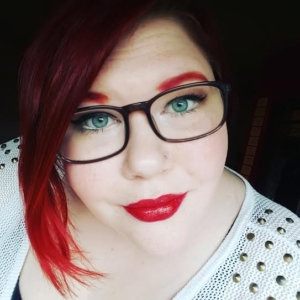Eating Disorders Have No Size
I was first diagnosed with an eating disorder in 2013 when I was 19, but my deadly eating disorder and terrifying habits had begun long before then. They started when I was 14 and progressed for five years until I was so deep in my eating disorder that I didn’t know how to get out.
Throughout my life I have been bigger than my peers, and that seemed to be a constant topic among everyone in my life: the bullies, family, and friends. However, no one acknowledged that my unhealthy eating habits were symptoms of a larger problem.
Instead, some people told me that I didn’t work out enough and that I was lazy, so that was why I was fat. I couldn’t survive off of salad and crackers and that’s why my weight was so high—because I lacked willpower. These harsh words were my reality for ten years. I was made to believe that my dangerous, disordered eating was acceptable because of my weight.
My parents even allowed me to try diet pills in an attempt to lose weight when I was 13. It wasn’t because they were more hung up on my weight than on my overall health; we simply didn’t understand how dangerous diet pills can be.
I saw women in my family engaging in extreme diets and exercise routines that, at the time, seemed normal, so I followed in their footsteps. At the age of 14 I began restricting. It was fine as long as I was fat, right? Not only was I sent signals that restricting was okay, but when I did openly try to lose weight through restriction I was given mixed signals; I was encouraged by family members to overeat and “live a little.”
Even now, with being open about my struggles with EDNOS, I receive many doubts from others that my eating disorder is even legitimate. Since May 2015, I have been the target of a hate website. Members of the website try to convince me that I’m making up my eating disorder. They have told me that I’m not truly as sick as I think I am, that I’m delirious and insane for making up such a thing, or that I’m a horrible person because I’ve taken support away from someone who has a “real” eating disorder.
Thankfully, when I went to my best friend and then my parents about my concerns with my bingeing, purging and restricting, they were supportive. My parents let me set up an appointment with an eating disorders specialist and I was able to get an evaluation. And when they were told I needed to enroll in PHP at their treatment center, they decided to help me pay the copayment so that I was allowed to go.
Even with the amazing support I’ve received from friends and family, recovery has not been easy. During my second stay in treatment, I felt as if I had no right to be there among so many thin, sick women because I myself wasn’t sick enough or thin enough. That was a huge hurdle I needed to face in treatment.
Up until my last day in treatment, I believed that I did not belong in the eating disorders and recovery community. Thankfully, I have learned from—as odd as it sounds—the cyber bullying. Through both the hate from cowards who hide behind a computer screen and the support I’ve received from complete strangers, I learned that my illness is valid and I don’t need to prove it to anyone.
Even on Christmas, of all days, I was harassed online by someone trying to convince me (through anger) that I was lying about the severity of my disorder. But as I’ve learned over the past few months, agreeing that I’m a liar and “coming clean” will not make them stop. They only want me to falsely say that I don’t have an eating disorder because they are uncomfortable with my body, and the idea that my size might not be a simple byproduct of laziness or unhealthy eating bothers them.
Others, sadly, are not so lucky. I’ve seen many people get turned away from treatment because they cannot afford it, or they’re discharged in as little as two weeks because insurance stops paying—often because their weight and BMI (and don’t get me started on the inaccuracy of the BMI) are in the “normal” range and the insurance company therefore does not believe they need the care they’re getting. Until we as a society change the mindset that only thin or underweight people suffer from eating disorders, many people will continue to live without the help they truly need and deserve.
For recovery resources and treatment options, please visit our help and support page. If you or someone you know is struggling with an eating disorder, call ANAD’s Helpline at: (888) 375-7767 or the National Alliance of Eating Disorders Helpline at: (866) 662-1235.
If you are thinking about suicide, call or text the National Suicide Prevention Lifeline at 988. In crisis situations, text “NEDA” to 741741 to be connected with a trained volunteer from the Crisis Text Line.
Rachel Taylor is from Tacoma, a city not far off from Seattle, Washington. She is attending college for her degree in creative writing. Her goal is to be a writer and public speaker and to break the stigmas with eating disorders, mental illness and fat acceptance. You can follow her blog.





